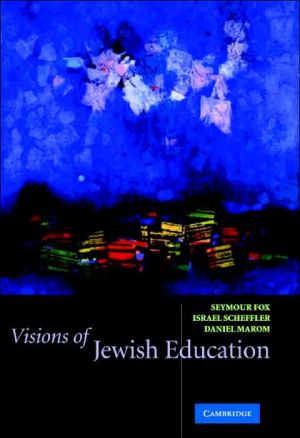

 |

|

The average rating for Visions of Jewish Education based on 2 reviews is 4.5 stars.
Review # 1 was written on 2012-09-27 00:00:00 Rodolphe Gautier Rodolphe GautierWhat do you want from your school? How do you want your children trained to live in the world as conscious, thoughtful Jews? This book provides insights from thought leaders on what Jewish education should provide, and how we should craft schools and curricula to achieve those goals. Brilliant. |
Review # 2 was written on 2017-01-08 00:00:00 Tamara Schwarz Tamara SchwarzI graded this down from a 5-star book because while interesting and well-written it bears the feeling of a bunch of long articles jammed together as chapters of a book, rather than of a book conceived as a whole. Heilman, as a decades-long observer of American Orthodoxy and in particular culture among the Hareidim and Hasidim, discusses many of the factors that have contributed to the sense (and, he documents, objective fact) that Modern Orthodoxy has moved rightward. One element of his analysis suggests inevitability -- that once MO culture opened the possibility of Jews, qua observant Jews, working within the professional economy (and achieving much, both professionally and economically) and in fact rewarded it in the sense that those who achieved in secular fields while remaining observant were pointed to in MO cultural institutions as "that's what MO is all about," that drove human capital into those remunerative fields rather than into Jewish education and the rabbinate. At the same time parent professionals left the Jewish education of their children to professionals, and the only place those professionals to staff day schools could come from was Hareidi groups-- where working in the secular world was not considered fully appropriate. Some of Heilman's analysis touches on, but doesn't fully examine, the sense that MO hasn't accomplished a full and coherent philosophy. Why allow this, but disallow that? How can we acknowledge academic analyses of text as reflective of the culture and mores that produce it, but then deny that all-male cultures would inevitably claim exclusion of women from certain activities as the Will of G-d? Heilman notes that the development, and evolution of a truly coherent MO philosophy is difficult because while the best and brightest of the postwar era were available within Jewish education and the pulpit rabbinate to create Modern Orthodoxy, the siphoning off of the brilliant to more remunerative professions limits further development of a MO philosophy that continues to meet the challenges of American social change. He looks at the influence of Hareidi publishers' control of the English-language sefarim market and the Hareidi/Hasidic monopoly on kiruv. But he doesn't analyze the effect that incoherence has on children as they move between schooling at the hands of right-wing teachers and those who chose Jewish education by default (this by no means indicates that ALL day school teachers are like this: Heilman looks at TRENDS). Heilman's chapters on Jewish humor and on posters would be interesting in an academic journal but felt like off-topic add-ons in the book, as if he didn't have enough there for a full standalone book with any analysis and had to fill pages. What remains is how to take Heilman's analysis and how to use his data and identification of trends to stop the slide to the right and to recover a truly Modern Orthodox philosophy that's responsive to 21st century America. |
CAN'T FIND WHAT YOU'RE LOOKING FOR? CLICK HERE!!!